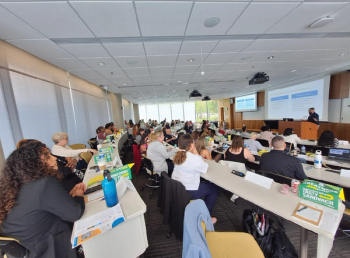
Effective Communication is Vital for Pharmacy Technicians

As the bridge between the pharmacy, the provider, and the patient, it’s essential for pharmacy technicians to develop and maintain good relationships with everyone involved in a patient’s care.
Good communication is perhaps more important in healthcare than in any other field. Quality care only happens when providers, clinicians and pharmacies all communicate clearly and effectively with the patient, with other healthcare providers and, most importantly, within their own teams.
When communication breaks down, it can cause serious patient safety issues: a study of ten years’ worth of medical errors found that 66% of those errors were caused by
Let’s take a look at how communication plays an important role in a pharmacy technician’s essential duties.
Relationship Building
As the bridge between the pharmacy, the provider, and the patient, it’s essential for pharmacy technicians to develop and maintain good relationships with everyone involved in a patient’s care.
Providers prefer to work with a pharmacy they can trust to provide a good patient experience (more on that later). If a provider thinks a pharmacy is making it difficult for their patient to get the proper care, they’ll think twice about sending anyone else there.
Teamwork & Delegation
Communication is also a vital part of building good relationships between members of the pharmacy team. Pharmacy technicians are the glue that holds the team together, and they need to know how to communicate with other technicians, pharmacy staff, and pharmacists.
Pharmacy technicians often have to give instructions or delegate tasks to others, and that requires good communication skills. Other team members should clearly understand what they’re being asked to do; more importantly, they should understand why they’re doing it. Knowing what to say is only half the battle — the other half is knowing how to say it.
Person A may just want the facts: what needs to be done and when. Person B, on the other hand, may need more information: what needs to be done, why it’s important, what happens if it’s not done, and so on. Good communication skills help pharmacy technicians identify what resonates best with each person, as well as how to tailor the message to ensure it is properly received.
Patient Satisfaction
Just like with team communication, good patient communication also depends on pharmacy technicians’ ability to identify and adapt to the communication style that is most comfortable for the patient.
Nonverbal communication skills are important for patient satisfaction as well. For example, maybe a patient has questions about their new medication, but there’s a line and they don’t want to make others wait. Nonverbal communication skills will help the technician pick up on the patient’s discomfort, and they can then apply their verbal communication skills to help address the patient’s needs.
Additionally, as more and more community members line up for COVID-19 vaccines at their neighborhood pharmacy, the need for solid soft skills becomes even more crucial for pharmacy technicians to avoid conflict, poor reviews and patient frustration.
As more and more community members line up for COVID-19 vaccines at their neighborhood pharmacy, the need for solid soft skills becomes even more crucial for pharmacy technicians to avoid conflict, poor reviews and patient frustration.
Patient Safety & Order Accuracy
Thirty years ago, most pharmacy patients had one doctor who prescribed all their medication. But patient needs have become more complex since then, and, as a result, patients are more likely to have different specialists for different needs. Good communication skills are indispensable when it comes to navigating the various members of a patient’s care team.
If one specialist prescribes a medication that could interact negatively with a medication prescribed by another specialist, the pharmacy technician is one of the last lines of defense protecting the patient from an adverse interaction. But without communication skills, they may not know how to address it with the pharmacist, the providers, or even the patient.
By the same token, pharmacy technicians are often the last people to verify an order before it’s given to the patient. If the pharmacist or another tech has made an error, the pharmacy tech needs to be comfortable communicating their concerns or addressing the error appropriately.
An Invaluable Tool
While learning on the job is a valid way to gain experience in soft skills, sometimes, a challenging patient-technician interaction can wreak havoc. Yes, the technician has learned a lesson of some sort, but at expensive price. Fortunately, NHA’s virtual simulation learning resource,
For pharmacy education programs and pharmacy employers, NHA’s interactive, all-in-one learning and assessment tool can equip current and aspiring technicians to handle those typical, day-to-day interactions with ease.
According to employers, the most important soft skills in a healthcare professional are critical thinking, professionalism and communication.
PersonAbility™ for Pharmacy Technicians
In PersonAbility™, you’ll find interactive lessons where pharmacy technicians can hone their skills in a variety of different areas, including:
- Appropriate communication techniques for patients, coworkers, and providers
- Overcoming communication challenges
- Effective communication with different patient populations
Pharmacy technicians learn the importance of effective communication and ways to improve communication before putting those skills to work with interactive practice examples.
A pharmacy is only as good as the team supporting it, and pharmacy technicians play a significant role in team performance. With practice and interactive training modules from PersonAbility™, pharmacy technicians can improve their communication skills to improve performance and become an even more valuable part of the pharmacy team.
Newsletter
Stay informed on drug updates, treatment guidelines, and pharmacy practice trends—subscribe to Pharmacy Times for weekly clinical insights.


























